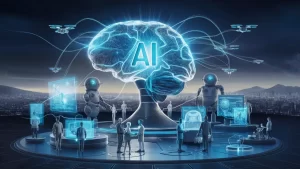Artificial intelligence (AI) might once have seemed like a futuristic concept reserved for sci-fi movies or groundbreaking scientific research. Today, however, AI has become a part of our everyday lives, seamlessly integrated into the tools and devices we use daily. But what exactly is “Everyday AI,” and how does it influence the way we live, work, and interact with the world around us? This article explores how AI has transitioned into our daily routines, the benefits and challenges it brings, and what we can expect from it in the future.
AI in Daily Routines
AI has quietly found its way into the most mundane aspects of our daily routines, streamlining tasks and offering unprecedented convenience. From the moment we wake up, AI is at work. Smart home assistants like Amazon Alexa or Google Assistant can provide a morning briefing that includes the news, weather, and even reminders for upcoming appointments. Smartphones leverage AI-guided apps to suggest optimal wake-up times or to track sleep patterns, encouraging a healthier lifestyle.
During commutes, AI-powered navigation tools like Waze or Google Maps analyze real-time traffic data to suggest the fastest routes. Grocery shopping has also become “smarter,” with AI learning our preferences and generating itemized shopping lists or even placing orders for us via e-commerce platforms. Streaming platforms such as Netflix and Spotify have algorithms that tailor recommendations based on our tastes, making entertainment selection both personalized and effortless.
The Impact on Productivity
There’s no denying the influence of AI on productivity. By automating repetitive tasks, AI allows individuals and businesses to focus on more meaningful work. Email inbox assistants prioritize important messages, while AI-driven scheduling tools like Calendly pave the way for seamless appointment setting. Applications like Grammarly and Jasper.ai even enhance the quality of your written communication, whether you’re drafting an email or creating content.
Workplaces also benefit from cost and time efficiencies driven by AI. Digital collaboration platforms integrate AI to transcribe meetings in real time or summarize lengthy discussions into clear action points. Inventory tracking systems, data analytics software, and customer service chatbots ensure operations are smoother and better optimized.
For entrepreneurs and smaller teams, AI is a game-changing productivity booster. It bridges gaps where resources fall short, allowing even the smallest businesses to scale and compete with larger market players. By freeing up time and lessening cognitive load, AI creates opportunities to do more in less time and with greater precision.
AI in Decision Making
AI also plays a critical role in helping us make better, data-driven decisions in both personal and professional spaces. AI systems process large sets of data and identify patterns that would otherwise go unnoticed. Whether it’s selecting the best investment opportunities, optimizing healthcare plans, or even deciding what type of workout best fits your fitness goals, AI algorithms simplify complex decision-making processes.
One prominent example is in e-commerce. Personalized AI recommendations guide consumers toward options they are more likely to purchase, reducing decision fatigue and offering tailored solutions. Similarly, businesses use predictive analytics to tackle everything from budgeting to HR strategies, minimizing risks and maximizing returns.
Even in governance, AI provides data-driven forecasts on issues like climate change or public health, enabling policymakers to make informed choices faster. The ability of AI to absorb, analyze, and present data with actionable insights gives individuals and organizations an invaluable edge in navigating decisions with confidence.
Ethical Considerations
While everyday AI delivers extraordinary benefits, it is not without ethical concerns. One of the primary challenges is data privacy. Many of these AI systems rely on the collection and analysis of vast amounts of personal data, and not all companies are transparent about how this information is used or protected. Breaches and misuse not only compromise privacy but also erode public trust in AI.
Bias in AI algorithms is another pressing issue. Since AI often learns from historical data, it can unintentionally replicate and even amplify existing societal biases. For instance, hiring software trained on biased data sets might favor certain genders or backgrounds while dismissing others.
There’s also the risk of over-dependence. When technologies make our lives easier, we risk becoming overly reliant on them, which could undermine problem-solving skills or critical thinking. Ethical regulations, transparency, and accountability from companies behind these technologies are crucial in ensuring AI-related developments prioritize user interests.
The Future of Everyday AI
The future of AI in our daily lives holds endless possibilities. Its ability to enhance personalization, improve efficiency, and revolutionize industries is far from its peak. Healthcare, for example, may see major advancements as AI becomes capable of predictive diagnostics and bespoke treatment plans. Education is also poised for transformation, with adaptive learning systems providing tailored curricula for students of varying skill levels.
Beyond individual use cases, AI developments in augmented reality (AR) and virtual reality (VR) could merge the digital and physical worlds for a more immersive experience. We might enter an era where AI fully integrates into our daily living spaces, anticipating needs we haven’t verbalized while operating seamlessly in the background.
This integration will not come without challenges, from ethical to infrastructural constraints, but the potential for positive change makes the future of everyday AI an exciting horizon to explore.
The Role of Everyday AI in Modern Living
Every day, AI has reshaped how we approach even simple daily tasks, balancing convenience with innovation. From enabling smarter choices to boosting productivity and fostering global connections, AI’s value in our lives is undeniable. However, the need to remain vigilant about ethical implications and over-dependence remains critical.
What’s next for Everyday AI depends on how society adapts to its dynamic nature. For individuals or organizations looking to pioneer this wave of technology, staying informed and educated is essential. Leveraging tools rooted in AI will empower you to make the most of technological advancements while ensuring they are used responsibly.
FAQs
1. What is “Everyday AI”?
Everyday AI refers to the artificial intelligence tools and applications integrated into our daily lives to enhance convenience, productivity, and decision-making.
2. How is AI used in daily life?
AI is used in navigation apps like Google Maps, voice assistants like Alexa, e-commerce recommendations, entertainment platforms like Netflix, and even smart home systems.
3. What are some concerns about AI usage?
Ethical concerns with AI include privacy breaches, data misuse, algorithmic bias, and over-reliance on AI-driven technologies in decision-making.
4. Will AI take over human tasks completely?
While AI is excellent for automating repetitive tasks and aiding decision-making, it’s designed to complement human efforts rather than replace them altogether.
5. What’s next for AI in personal and professional life?
Future developments in AI may further revolutionize industries like healthcare, education, and personalized experiences, offering even more efficiency and innovative solutions.




